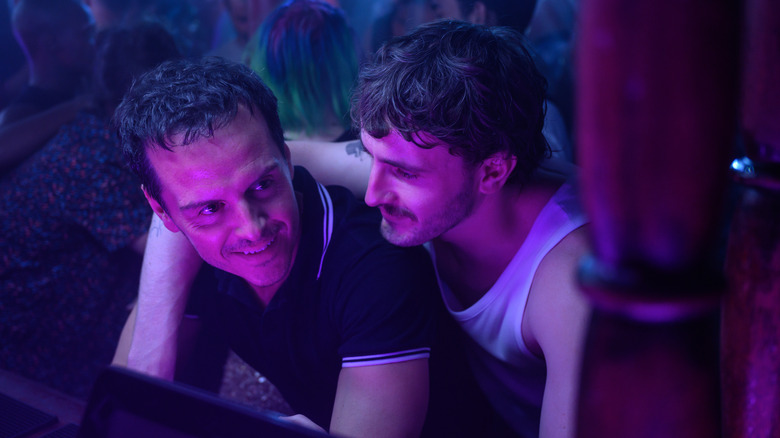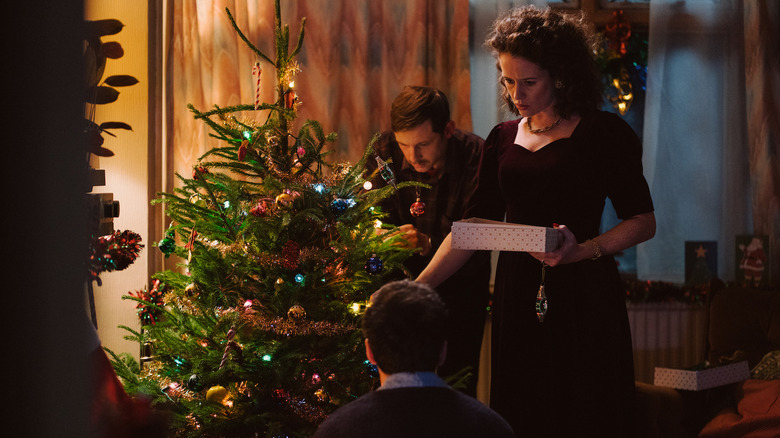All Of Us Strangers Review: Andrew Scott And Paul Mescal Star In A Well-Acted But Crushingly Sentimental Drama [Austin Film Festival]
Grief and trauma have become increasingly popular subjects for filmmakers to tackle in recent years. While much of the discussion surrounding these topics centers on modern horror cinema, they stretch far beyond the confines of that genre into everything from bid-budget science-fiction to animated films for children to television sitcoms. This rise in exploring the hardships of one's own life and struggling to identify how you fit into the world no doubt has been affected by the growing acceptance of therapy in society. While it's wonderful that so many people are taking the time and space to look inward and try to find some peace, rendering that therapy on screen doesn't always make for the best cinema.
Enter "All of Us Strangers," the latest film from British filmmaker Andrew Haigh, which feels like a therapeutic exercise occurring in realtime. Now, that isn't an inherently bad thing, and there have been plenty of good movies where it feels like the filmmaker is working through some real s***. However, the way this particular exercise plays out only offers pat resolutions to issues that should be specific but come across as overly routine. Though I don't doubt "All of Us Strangers" comes from an honest place, the film results in something far more maudlin than emotionally engaging.
Adam (Andrew Scott) lives alone in his London flat, working as a screenwriter. He has recently started to write about his parents, both of whom died in a car accident before Adam was even a teenager. Upon returning to his hometown to reflect, he visits his childhood home, and his parents (Claire Foy and Jamie Bell) seemingly still live there, existing at the age Adam last saw them. Whether this is a projection of his memories or a genuine visit by spirits of some kind doesn't really matter: What matters is Adam has a chance to present his full self to his parents, which he never got the opportunity to do, and converse with them about the many things in his life that have led him to live in pain and isolation. Most notably, Adam is gay, and he never had the opportunity to come out to his parents.
Meanwhile, Adam strikes up a relationship with a younger man named Harry (Paul Mescal), who is perhaps the only other tenant in his building. Though Harry comes from a generation that didn't grow up under the thumb of Margaret Thatcher and the AIDS epidemic, he and Adam find a kinship with one another as gay men who have always felt adrift and alone in the world.
Not maximizing a premise
The conceit of "All of Us Strangers" is an inherently potent one, whether you are someone who has a good relationship with your parents or a nonexistent one. If there's anyone you want to love and accept you for exactly who you are, it's your parents, and if death has removed that as a possibility in your life, something will always be twisted up inside you. The problem comes with the film utilizing that conceit. Ultimately, the scenes with the parents feel like they have been ripped straight out of the script pages of dozens of other coming out narratives, but instead of it being about someone in their early 20s and their parents, Adam is in his late 40s. The emotional catharsis he reaches in each encounter, which inevitably end with him in tears each time, are far too broad and familiar, despite the circumstances under which they occur being anything but. Adam has been holding on to three decades of anguish, and his conversations with his dead parents don't really reflect that lengthy amount of time.
None of these issues can be put at the feet of the quartet of brilliant actors here, each of whom are giving their whole selves over to make this material appear deeper than it is. What struck me about Andrew Scott's performance wasn't his tear-filled talks with Claire Foy and Jamie Bell (though he's just as locked in for those), but his physicality. Adam is someone uncomfortable in his own skin, and he performs certain tasks — like holding someone's hand or taking off his clothes — like this is the first time he's ever done these things. There's an inelegance in them and an awkwardness with how he carries himself, but there's no indicating going on at all. He's just living and breathing that person. That can be said for the other three actors as well, particularly Claire Foy, who finds some idiosyncratic notes to play in what is probably the most stock character of the bunch.
I generally am a pretty big fan of Andrew Haigh's work. Films like "45 Years" and "Lean on Pete" are packed to the brim with pure soul with a elegant visual sense to match. "All of Us Strangers" has plenty of visual dynamism. Shot on 35mm by cinematographer Jamie Ramsay, the colors feel warm without being inorganic, aiding in the film's hazy, dreamy atmosphere. There's a beautiful sensuousness in the scenes between Scott and Mescal, and in the scenes with the parents that essentially work as time travel to late '80s/early '90s, the 35mm helps in conveying the period spectacularly.
What's missing here is that pure soul. The film seems like it should be this deeply personal exploration of one's own struggle to connect with others because of an inability to fully accept themself, but in practice, "All of Us Strangers" plays more like a sentimental novel you'd find at an airport newsstand. It's made with far more skill and care than those typically are, but at its core, they contain about the same amount of emotional insight. Because of its exceptional performances and striking look, it may be enough to wring some tears out of you. As someone who has responded that way to Haigh's previous works, I was expecting that to happen to me. Instead, I was left wanting more.
/Film Rating: 5.5 out of 10

